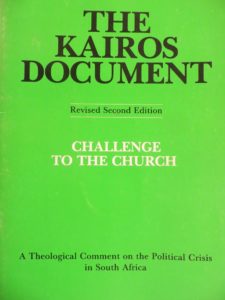 Kairos Theology
Kairos Theology
“This is the moment of grace and opportunity, when God issues a challenge for decisive action.”
Kairos South Africa “Challenge to the Church,” 1985
Kairos is a Greek word for time that exists outside of our linear counting of days, weeks, and years. It is distinct from the Greek kronos, meaning chronological time.
In the Bible, Kairos is the right or favorable moment, when history opens up to the possibility for fundamental change, when, to quote Robert McAfee Brown, ‘God offers a new set of possibilities and we have to accept or decline.”
Kairos is a public theology – a theology whose function, in the words of theologian Duncan Forrester, is to “contribute to a public discussion by witnessing to a truth which is relevant to what is going on in the world and to the pressing issues facing people and society today.” In this, it hearkens back to the original kairos, the confrontation of a visionary, prophetic figure with the evil of empire – the man from Galilee standing up to the greatest power in the world.
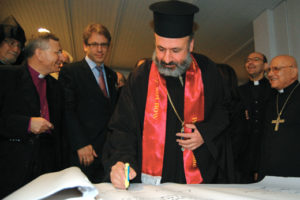
Kairos theology, like all theology, is a living thing, constantly unfolding and expanding and deepening. Like all theology, it is only alive when it is doing its job – helping us understand what God expects of us in relationship to our fellow creatures and the natural world that has been given to us. And like all theology, it is only valid as long as it remains in conversation with history. Kairos is a response to a proper reading of the signs of the times.
Kairos presents what one person has described as a case of “insurmountable opportunity.” Even when – and usually this is the case – the objective is clear but the road is uncertain and full of hazards, we must go. Even in the face of opposition and persecution, we must go. And we must revisit continually the experience of those who lived the original Kairos opportunity, as recounted in the Acts of the Apostles: 4:19-20 “We cannot but speak of what we have seen and heard.” 5:29 “We must obey God rather than any human authority.”
Palestinian Kairos Theology
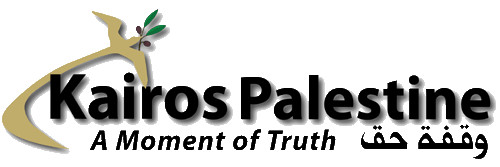 The Kairos Palestine Document
The Kairos Palestine Document
A Moment of Truth: A word of faith, hope and love from the heart of Palestinian suffering
The Kairos Palestine Document is a profound statement of faith, a description of Palestinian life under occupation, and an urgent call to action for the worldwide Church. Presented to the world by Palestinian Christians in Bethlehem, December 2009, endorsed by The Thirteen Patriarchs and Heads of Churches in Jerusalem and signed by thousands of Palestinian Christians, this document has initiated a global movement of Christian responses to the Palestinian call.
Study Resources for the Kairos Palestine Document
Kairos USA – Call to Action Study Guide and Curriculum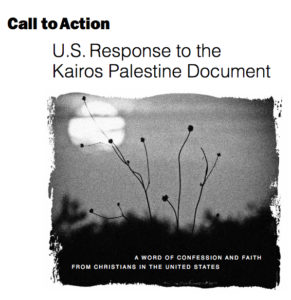
A study guide for church groups in six sessions including instructions for the facilitator. Curriculum covers Kairos Theology, the “Signs of the Times” in Israel/Palestine and the U.S., considers interfaith issues, and much more. All materials can be downloaded at the link above.
IPMN – Kairos Palestine Study Guide
(scroll down that page)
A guide for three sessions; the 24-pp. booklet includes the Kairos Palestine document and can be ordered online. See a PowerPoint presentation and study aides that can be downloaded at the link above.
See the outpouring of responses to Kairos Palestine from around the world in our website section: Global Kairos
Liberation Theology
At the heart of Liberation Theology is the belief that, in the struggles of poor and oppressed people against their powerful and rich oppressors, God sides with the oppressed. Throughout the Bible, God champions the cause of those who are poor and beaten down as they struggle for dignity, freedom and economic justice. When the children of Israel suffer under enslavement in Egypt, God hears their cry and delivers them to freedom. When the Israelites are settled in the Holy Land, there are rich and powerful among them who live without regard for the sufferings of the poor. God raises up prophets to challenge an unjust society and call the rich to repentance.
In the New Testament, Jesus comes as a liberator. Mary says of the son she is to bear: “…He has scattered the proud in the imagination of their hearts. He has put down the mighty from their seats, and exalted them of low degree. He has filled the hungry with good things; and the rich He has sent away empty. (Luke 1:51-53 ) Jesus declares that He has come to bring “good news for the poor” and to “preach deliverance to the captives” (Luke 4:18-19).
This biblical theme of liberation has been embraced by many oppressed peoples in modern history.
Palestinian Liberation Theology
 The leading source of teaching on liberation theology in Palestine is the Sabeel Ecumenical Liberation Theology Center in Jerusalem and Nazareth, founded in 1989 by Rev. Naim Ateek. The following can be found at the website of Friends of Sabeel North America (FOSNA).
The leading source of teaching on liberation theology in Palestine is the Sabeel Ecumenical Liberation Theology Center in Jerusalem and Nazareth, founded in 1989 by Rev. Naim Ateek. The following can be found at the website of Friends of Sabeel North America (FOSNA).
The Theology of Sabeel—What We Believe
Ten Characteristics of Sabeel’s Theology:
It is a contextual theology. Sabeel’s theology arises from a particular context, namely, the Palestinian historical context and experience of oppression under the state of Israel.
It is a liberation theology. We seek, like all liberation theologies, liberation from a particular situation of injustice.
It is an ecumenical theology. We seek to bring together all Palestinian Christians, all the Christians of the land of Palestine who have been divided by so many schisms going back to the 4th century A.D., to work together as one Palestinian local church.
It is an interfaith theology. We seek to bring together Jews, Christians and Muslims, the three peoples of the Abrahamic faiths, to work together for justice and peace in this one land.
It is not identified with any one political party, but we are not apolitical. Rather we deal with politics and with all reality, from a faith perspective. We speak from a comprehensive reality of life.
It is not just critical theology. Rather we offer solutions; we provide a vision of alternatives to the present unjust situation.
It is biblically based. We seek to counteract the misuse of the Bible but offer a deeply rooted vision of how the Bible points to justice, liberation and peace, from the context of a theology of the land.
We critique Christian Zionism. Christian Zionism is a prime example of the misuse of the Bible to promote violence, racism and injustice. We show why this kind of theology is not authentic to the Bible.
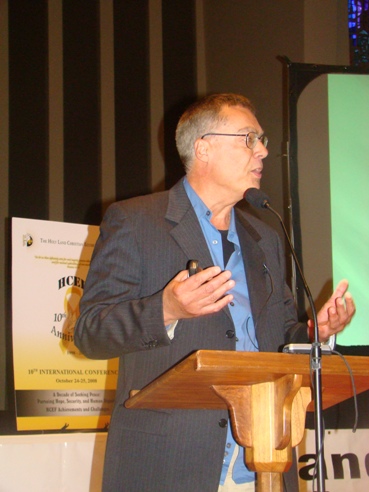
We also address the apathy of mainline Christians. Christian Zionism is not just a problem of evangelical conservatives. There is a subtle and more diffuse theology of mainline Christians, which justifies domination of the land and Palestinian people from the perspective of ideas of election, chosenness and the promised land, as well as recompense for the Holocaust. We critique the mistaken premises of this kind of mainline Christian thinking, especially in the West, that promotes Christian silence and apathy toward the Palestinian plight.
It is a theology of nonviolence. We reject all forms of violence and seek to follow Jesus in the Way of nonviolence toward authentic justice and peace.
Seven Themes of Sabeel’s Theology
Sabeel’s theological vision explores seven key themes:
1. We address the issue of God. What kind of a God do we believe in? A racist God who chooses one people against others or a loving God of all peoples.
2. We focus on Jesus Christ as the criterion of interpretation of the biblical message. This means we emphasize not just Jesus’s divinity but the fullness of his humanity in his historical context and reality, as a Palestinian Jew living under the occupation of the Roman empire. We are followers of Jesus Christ in his way of nonviolent resistance to imperial occupation.
3. It is a prophetic theology. We stand in the line of the great prophets of ancient Israel in their unmasking of injustice and call for justice.
4. We stand particularly in the line of the theology of the book of Jonah (the first Palestinian liberation theologian), which we see as the climax of the theology of the Old Testament and which dismantles the theology of exclusivism and racism of his day. The theology of the book of Jonah discloses a) an inclusive God, a God of all nations; b) an inclusive people of God, a people that includes those on both sides of nationalist conflicts, the Ninevites, as well as the people of Israel; the people of Iraq today and those in the West; in Palestine, Jews and Palestinians; and c) a theology of the land for all the peoples of the land.
5. It is an anti-imperial theology. It critiques all theologies of empire, whether the Roman Empire in the biblical context or American empire today. Sabeel stands in the tradition of the anti-imperial theologies of both Hebrew Scripture and the New Testament.
6. We challenge Son of David christology, a messianic theology with its imperial designs, in favor of a Suffering Servant christology. We reject the false fusion of Suffering Servant Christology with Son of David Christology that occurred later in the Church’s history with its integration into the Constantinian Roman Empire. We root ourselves in the Suffering Servant Christology of the early Church with its witness to the nonviolent way of the cross.
7. Ours is a theology of peace and reconciliation. This is not peace at any price, but a way to peace through justice, which brings authentic reconciliation of estranged peoples into a new relation of just peace.
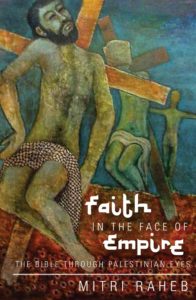 Resources
Resources
Sabeel – PDF: The Jerusalem Sabeel Document: Principles for a Just Peace in Palestine-Israel – 6 pp.
Book: Justice and Only Justice, by Naim Ateek
Book: A Palestinian Christian Cry for Reconciliation, by Naim Ateek
Book: Faith the Face of Empire: The Bible Through Palestinian Eyes, by Mitri Raheb



